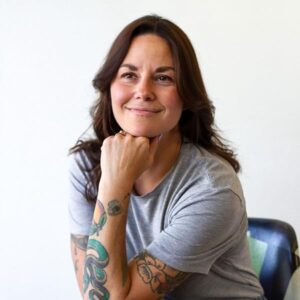Bad romance; epic realizations; Montreal circa 2000
Late September
by Amy Mattes
Madeira Park: Harbour Publishing, 2024
$22.95 / 9780889714564
Reviewed by Jessica Poon
*

The debut novel by Nanaimo’s Amy Mattes, Late September is a voice-driven coming-of-age story starring Ines, a twenty-year-old skateboarder who moves to Montreal, away from her parents, small town, and the haunted memory of her dead sister, Clara. Although Ines doesn’t speak French, it’s not long before she has friends—Felix and Marie, a married couple who both skateboard; April, a beautiful and confident cam girl who introduces Ines to the industry; and Max, a photographer and filmmaker who quickly becomes her boyfriend.
It’s set in 2000, which means Discmans and walkie-talkies instead of iPhones and Bluetooth. At one point, a character describes a man as having “ghosted,” which, in its contemporary sense, was not lexically in vogue until 2015, which did ruin the early aughts spell a bit. Maybe that character was just ahead of their time. Since everyone has artistic leanings and is terminally young, everything is intense and, of course, drinking and drug use are a given.
Ines’ relationship with her mother is on the side of strained. Mattes renders the young adult voice well with a forthright, self-aware impulsivity: “I could hear Mom’s voice say, ‘You’re being unreasonable, Ines.’ I wanted to be unreasonable.” Her father, who wanted a son, buys her pink clothing to try and reaffirm gender stereotypes. Unsurprisingly, neither of them is ecstatic about the possibility of a lesbian or bisexual daughter. It’s a good thing Ines is in Montreal. After all, if you can’t become an absurdly happy person bereft of trauma, you can at least change the location where you hate yourself. Mattes describes Montreal with precise detail; I’ve never been, but I felt like I was there.
Ines doesn’t work as a cam girl for long, never quite acquiring April’s level of brazen confidence and getting spooked after an alleged couple try to meet her in person. A total novice, she’s hired at an upscale French restaurant, which did provoke my incredulity a little bit, given how notorious restaurants, especially fine dining ones, prefer to hire people with experience.

Ines doesn’t talk about Clara with anyone, let alone how guilt-stricken she is, as she mistakenly believes herself to be responsible for Clara’s death. Initially, Max seems that most impossible of mythical things: an ideal boyfriend. He’s a sensitive, charismatic artist she can confide in, who thinks beyond his own satisfaction in the bedroom.
Before you can go around singing “put a ring on it,” though, it’s not long before Max starts evincing a different side of himself, buying Nike sneakers off eBay with ambitions to resell them and overall becoming less empathetic. At one point, he invites himself over and says he’ll bring a movie and he initiates anal sex Ines doesn’t consent to, which is rendered in stark detail. The movie is not mentioned. Ines is hardly a stranger to being treated like a mere body rather than a sentient being. Early on, it is established that she has been raped before, which Ines describes without pathos: “It wasn’t violent, and it happened to a lot of the girls at the school.”
But such behaviour is shocking from Max. Ines is reminded of a particularly distressing diary entry her mother once read, which ultimately led to Ines lying to her mother that the diary was pure fiction. But the incident with Max, who continues to deteriorate in mental health, is never brought up again, which struck me as a rather curious choice. Why have this horrific, realistic scene, which clearly causes Ines pain, only for Ines and Max never to discuss it? As a result, I loathed Max, who is eventually institutionalized, for his treatment of Ines.
I think of Freddie deBoeur writing about mental illness:
Actual mental illness is grubby, sad, gross, dispiriting, destabilizing, undermining, exhausting, unpalatable, ugly, and definitely not politically correct. … What is required is far harder than holding people totally blameless or throwing them in the trash. What is required is to mitigate judgment, to complicate responsibility. To live with that complication. To live without certainty. To not be able to rest easy, feeling comfortable, ladling out understanding and judgment in perfectly untroubled proportions. No one is forcing you to like Kanye West.
Yes, it is true. Nobody is forcing me to like Max. I did, though, feel disappointment that the ramifications of Ines being in a heterosexual-presenting relationship was never touched upon. It struck me as a squandered opportunity to illuminate the phenomenon of both inadvertent and intentional bi-erasure, which, to my recollection in contemporary literature, is best explored in Alyssa Songsiridej’s Little Rabbit.
Ines is conflicted. In two successive pages, she thinks: “I questioned whether this was really love at all, or just another ill-fated experience to become jaded by.” It’s the sort of throwaway line that made me cringe in recognition because what gets called love now is often regarded by your future self as a colossal mistake. How can you know? In this sense, Ines’ line seems like a pre-emptive retrospective wisdom, an anticipatory cynicism, a sentiment a twenty-year-old would certainly have, but also a thirty-year-old, and beyond, even. What this says about people’s luck or lack thereof in love, and their evolution—well, that’s a separate soapbox.
Shortly afterwards, though, Ines thinks: “To me, a man’s hands around my waist felt like the most intimate touch possible. In all my previous sexual experiences it was an area that men skipped right over. If he was touching me like this maybe everything was going to be okay.” These lines are especially poignant, capturing the kind of bargaining people do when their relationship is clearly foundationally insecure.
Though hardly a novel standing in as PSA against drug and alcohol reliance, the casualness with which Ines does MDMA, among other substances, does eventually does get commented on by a friend. In this sense, I think the true love story is not between Ines and Max, but Ines and her friends. Ines’ friends have not known her for long but are fiercely loyal and constantly affirm her worthwhileness as a person in ways that her love interests and parents have generally always fallen short.
The other competing love story is simply Ines, learning how to be Ines, wherever she decides to go. This novel is full of both hope and despair, a believably human portrait of a young woman who confronts bad romance, familial loss, and insecure finances, and, bit by bit, comes closer to realizing that the person she longs to escape, and the person she wants to be, might actually just be in the mirror.
*

Originally from East Vancouver, Jessica Poon is a writer, former line cook, and pianist of dubious merit who recently returned to BC after completing a MFA in Creative Writing at the University of Guelph. [Editor’s note: Jessica Poon has reviewed books by Louis Druehl, Sheung-King, Loghan Paylor, Lisa Moore (ed.), Sandra Kelly, Robyn Harding, Ian and Will Ferguson, Christine Lai, Logan Macnair, Jen Sookfong Lee, J.M. Miro (Steven Price), Bri Beaudoin, Tetsuro Shigematsu, Katie Welch, Megan Gail Coles, and Ayesha Chaudhry for BCR]
*
The British Columbia Review
Interim Editors, 2023-25: Trevor Marc Hughes (nonfiction), Brett Josef Grubisic (fiction)
Publisher: Richard Mackie
Formerly The Ormsby Review, The British Columbia Review is an online book review and journal service for BC writers and readers. The Advisory Board now consists of Jean Barman, Wade Davis, Robin Fisher, Barry Gough, Hugh Johnston, Kathy Mezei, Patricia Roy, Maria Tippett, and Graeme Wynn. Provincial Government Patron (since September 2018): Creative BC. Honorary Patron: Yosef Wosk. Scholarly Patron: SFU Graduate Liberal Studies. The British Columbia Review was founded in 2016 by Richard Mackie and Alan Twigg.
“Only connect.” – E.M. Forster
3 comments on “Bad romance; epic realizations; Montreal circa 2000”